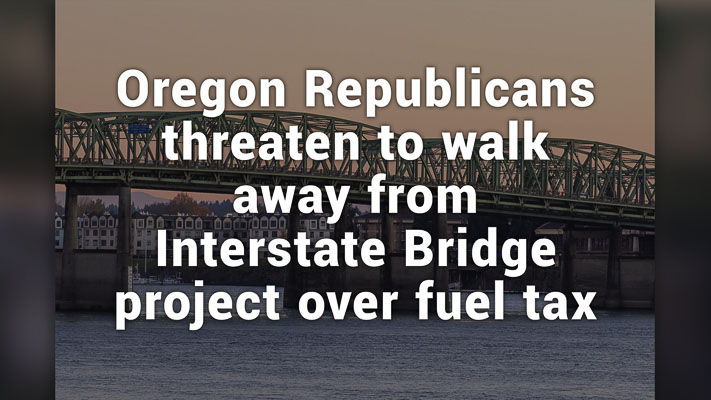
Washington senator says Oregon governor living in Fantasyland
The tax war between Washington and Oregon, Idaho, and Alaska has heated up again. Democrats controlling the state legislature introduced a 6 percent tax on fuel refined in Washington and exported out of the state. There also was an 11 cent tax on jet fuel in the transportation package. That has prompted threats of retaliation from Alaska, Idaho, and Oregon.
Oregon Republicans have threatened to walk away from the Bi-State Bridge Committee of 16 legislators that provide oversight to the Interstate Bridge Replacement (IBR) program. Yet Sen. Annette Cleveland (Democrat, 49th District) added $200 million to the IBR funding package, upping the ante to $1.2 billion for the project.
The rhetoric has heated up between the states. Washington Sen. Marko Liias (Democrat, 21st District), chair of the Senate Transportation Committee and author of the transportation package, said Oregon Gov. Kate Brown is living in Fantasyland. He also said her most recent statement was a joke.
The $16.8 billion transportation package is the largest in state history. It does not directly raise the gas tax on Washington residents, but instead raises $2 billion by taxing refined fuels shipped to other states. It is estimated Oregon gets 90 percent of it’s fuels from Washington refiners.
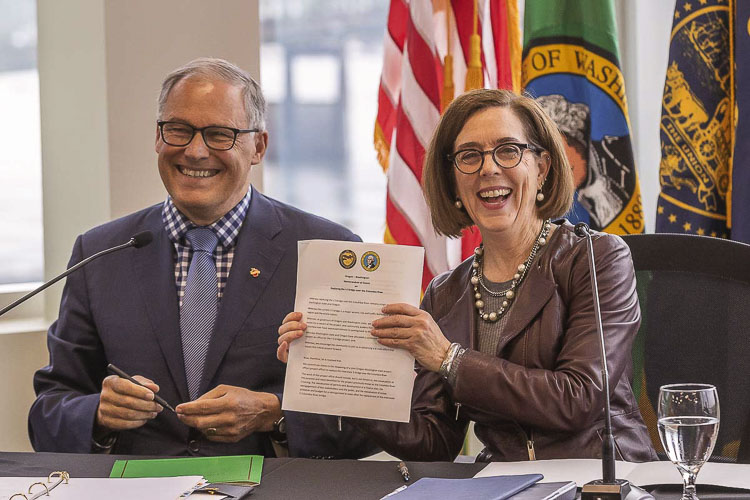
Alaska Rep. Kevin McCabe has introduced new taxes on crude oil exported from that state to Washington, plus a tax on fish and fishing boats. The Oregon, Idaho, and Alaska governors have called Gov. Jay Inslee encouraging him to stop the legislative proposal, or veto it if it shows up on his desk. Inslee “strongly” supports the measure, said Jaime Smith, the Inslee spokesperson.
Idaho House Speaker Scott Bedke talked about Washington lawmakers extorting money from their neighbors. “Neighbors don’t do neighbors that way,” Bedke said. “We’re alarmed. We don’t think that friends and neighboring states should do each other this way, and we’re looking at all of our options.”
The tax-your-neighbor battle has prompted Republicans in Oregon to threaten walking away from the bipartisan committee to fund the I-5 Bridge replacement project.
“Republicans will not stand by and let Washington raise the cost-of-living for our residents without a fight,” wrote Oregon Sen. Lynn P. Findley (Republican, Vale), a member of the Bi-state committee, in a news release.
“If the majority party in Washington thought we would turn a blind eye when they force us to pay for their roads, they are mistaken,” added Oregon Rep. Shelly Boshart Davis (Republican, Albany), who also serves on the committee.
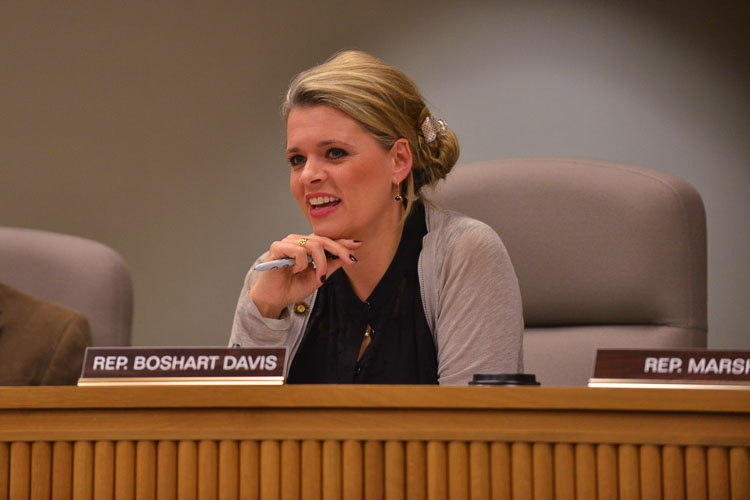
Boshart Davis was so upset by the idea that she testified against the bill at a hearing in the Washington State Legislature. She remembers the chair of the committee telling her it was a “unique experience” to have an out-of-state lawmaker testifying in front of the committee.
“Well,” she recalled responding, “it’s a unique experience being taxed by another state.”
In a news interview, Boshart Davis said the speed with which the Washington state tax was moving stood in stark contrast to the approach Oregon took when passing its own transportation legislation in 2017. Lawmakers toured the state and took input from residents for a year before passing a gas tax hike, and then they settled on increasing the rate by a penny a year over 10 years.
There was no mention in the interview of Oregon choosing to tax Washington residents via the tolling proposal included in the HB2017 transportation package. Oregon decided to begin tolling “at the border” with Washington, now the focus of intense debate in the region.
The Washington state proposal by comparison, would increase gas taxes by six cents all at once next year, she said.
While Washington and Oregon officials have clashed on various issues over the years, the gas tax hike seems especially “blatant,” Boshart Davis said. “This is literally taking Oregonians’ own money to pay for their own projects.”
The battle comes as Republicans look for leverage in transportation talks. Washington Rep. Andrew Barkis (Republican, 2nd District) told KTTH last week that the GOP was left out of the conversation as the transportation package was drafted by Democrats.
Last session’s transportation bills were checked by Republicans in the Democratically-controlled legislature as they required supermajorities to issue the debt to fund the legislation. That problem was sidestepped by the new transportation chair, Senator Liias. The tax package sources most of its funds through the Climate Commitment Act and the aforementioned tax on fuel exports.
On Wednesday, the Senate Transportation Committee earmarked an additional $200 million to the I-5 Bridge project via an amendment drafted by Senator Cleveland. A total of $1.2 billion is now targeted for the project.
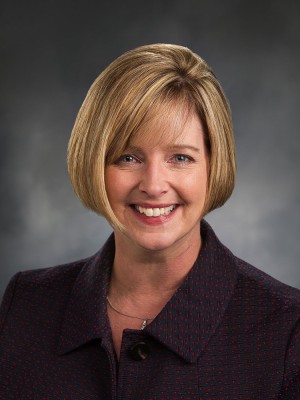
“The interstate bridge between Vancouver and Portland is very much in need of replacement,” Cleveland said Wednesday. “Last week marked its 105th anniversary. It was the first bridge between Washington and Oregon, the first automobile bridge ever built.”
Cleveland had successfully amended the tax package in an earlier committee meeting. Her proposal delayed the start date the export fuel tax is collected by five months.
Liias on Carlson’s show
Liias appeared on KVI’s John Carlson radio show this morning, discussing the transportation package and the fuel tax. Carlson said the measure barely passed the House Transportation Committee, 15-14 as a couple Democrats joined Republicans in opposition.
Because of all the controversy and the close vote in the House, Carlson asked if the tax was going to go away?
“I don’t think so,” Liias responded. “I think what’s true is we have five refineries in Washington that have impacts on our communities. They refined fuel for Washington, they also happen to refine fuel for other states. Our own state taxpayers pay 49 cents a gallon of fuel when fuel leaves one of those refineries. These other states pay nothing.”
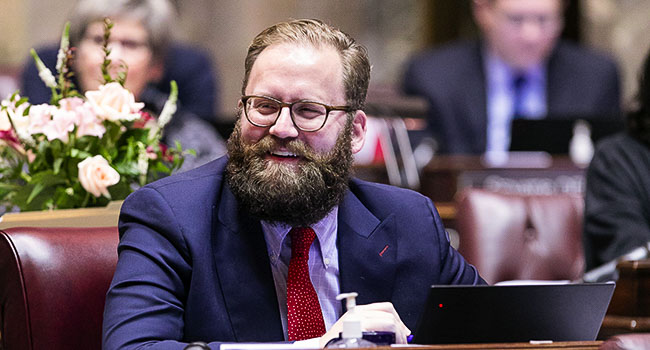
“We’re not taxing this because of crossing a state line,” Liias said. Carlson pushed back – “that’s what triggers the tax!” Liias responded: “What we’re taxing here is fuel that’s made in Washington that has an impact on our state.”
Liias said that fuel leaving the state was exempt from tax in the past, but this bill has the other states contribute towards the impact their fuel has on our state and our transportation system. He said it also has an impact on air quality and greenhouse gasses and they need to fund our mitigation of climate issues.
Carlson read Governor Brown’s public comments regarding her conversation with Inslee. She said the fuel export tax was “unacceptable.”
“Governor Brown’s line is a joke,” Liias responded. “The State of Oregon charges $300 million on Washingtonians that crossed the border to work there every year.” He said the 6 cent tax is not an “onerous burden.”
“Her state basically lived off of Washington state residents $300 million. Our residents aren’t benefiting from their pain and income taxes to Oregon,’’ Liias said. “This governor down in Oregon is living in Fantasyland. She’s in the last few months of her term. She’s losing relevance. She’s a lame duck. Obviously, she’s grasping for something to stay in the headlines.”
Sen. Marko Liias and KVI radio host John Carlson discuss the $16.8 billion transportation package. Liias believes the Democrat proposal is constitutional. He defended many facets of the package including a large allocation to transit and the export fuels tax. Audio courtesy KVI.
Liias believes the proposed law is constitutional, but admits lawsuits will determine that once the law is enacted. Governor Inslee has indicated he will sign it, but that was before the outrage from neighboring states.
Liias promoted the package, indicating roughly half the money is going towards roads and bridges. About $2.5 billion for new projects and another $3 billion for road and bridge maintenance.
Carlson responded that $3 billion was allocated to transit, when mass transit only serves about 4 percent of daily trips, yet it’s getting more money than repairing infrastructure that serves 90 percent of people’s trips. “Doesn’t that guarantee you’re going to have more congestion?” he asked.
“It’s a force multiplier,” Liias responded, saying transit will carry more people and can free up space on freeway lanes for those using their cars.
Carlson asked if the fuel tax fails in the House, how would Liias make up for the $2 billion hole in funding.
“The House Committee approved the bill with the export tax in it,” Liias responded. “We’re continuing in that direction. If something changes, we’ll deal with it when we cross that bridge. But at this point, the plan is to proceed with the bill as it was as it was passed out of the House Committee.”
With the Democrats in the Washington House of Representatives split on the transportation tax package, and sensitive to 2022 being an election year, it remains to be seen if the legislation can be passed in the House.
The Washington State Legislature is in session until March 10. Oregon’s 35-day session began Feb. 1 and should end around March 7. Idaho’s legislature will remain in session after the Washington legislature has ended. Alaska’s legislature will be meeting through May.




